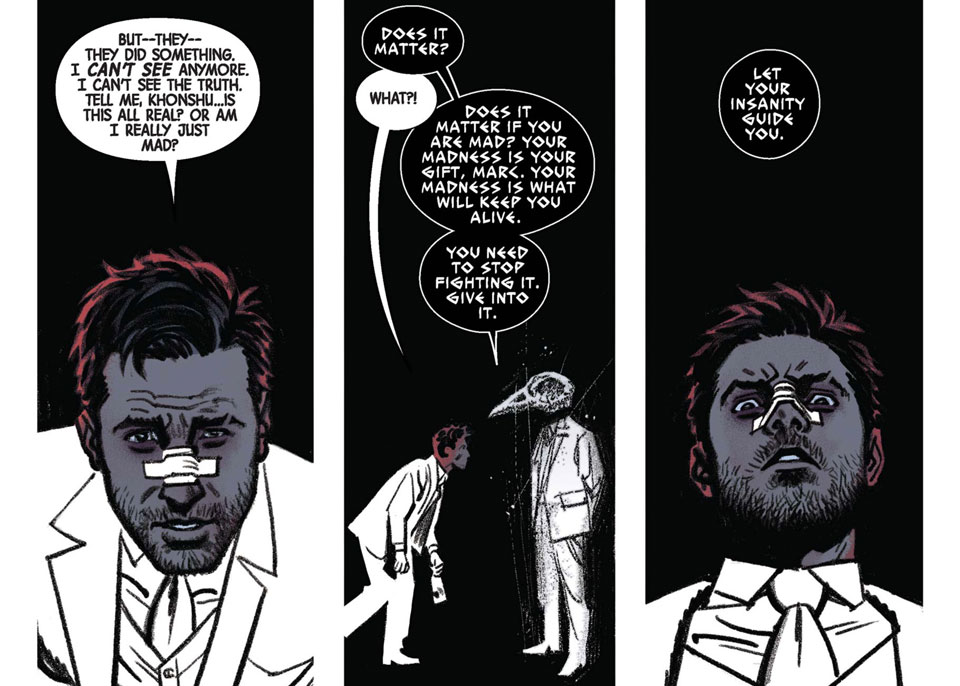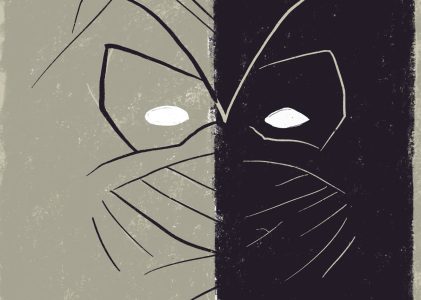Hollywood’s fascination with mental disorders is almost as problematic as it is long-lasting.
Fictional portrayals, even those that attempt to be sympathetic, tend to reflect popular perception rather than attempt to correct misconceptions.
Even worse, many movies abuse mental disorders as lazy shorthand for villainous, anti-social behavior. In far too many movies and television shows, “crazy” people are either incompetents who are the butt of cheap jokes or violent mass murderers.
Previously referred to as Multiple Personality Disorder, and often mislabeled schizophrenia, Dissociative Identity Disorder (DID) is one of Hollywood’s favorite mental disorders. From dramas like Three Faces of Eve (1957) and Sybil (1976) to action flicks like Fight Club (1999) and Split (2016) to comedies like Me, Myself & Irene (2000), DID has been mined over and over for dramatic effect. And, really, it’s no wonder: audiences are fascinated by, and actors gravitate to, the creative challenge of a single star portraying multiple people inside of one body.

So when Disney announced that they were releasing a limited series for the Marvel character Moon Knight, there was little expectation that a comic book character would provide one of the most positive, nuanced-and dare we say, accurate-portrayals of what it is like to live with DID. But that’s exactly what the creative team behind Moon Knight set out to do.
To help the filmmakers craft an accurate depiction of living with DID, the production brought on board-certified psychiatrist Dr. Paul Puri as a consultant. Puri is a TV writer himself, who frequently serves as a subject-matter expert, analyzing mental health topics for popular shows like Breaking Bad and Better Call Saul.

Access to that expertise was essential to Moon Knight star Oscar Isaac, the man most directly responsible for portraying Moon Knight’s multiple identities. According to Isaac, “I think it was just about being honest to what Dissociative Identity Disorder is, and honest to what a lot of people have to deal with, which is really intense childhood trauma and how that manifests as an adult. I think for us it was about authenticity, more than even story communication.”
What is Dissociative Identity Disorder?
Formerly known as multiple personality disorder, DID is characterized by alternating between multiple identities. Often these identities may have unique names, characteristics, mannerisms, and voices. People with DID will experience gaps in memory, including everyday events, personal information and trauma.
DID most often forms as a coping mechanism for young children exposed to long-term physical, sexual or emotional abuse. Natural disasters and combat can also cause dissociative disorders.
While often conflated with schizophrenia or psychotic breaks (especially in popular media), and some symptoms do overlap, DID is different in important ways, including causes, treatments, and age of onset.
Who is Moon Knight?
‘Who is Moon Knight?’ isn’t exactly a simple question – partially because even he himself doesn’t always know, and partially because the answer has changed dramatically over the last 50 years.

In the 1970s, Moon Knight debuted as a villain who eventually embarks on his own crime-fighting adventures. In this incarnation, Marc Spector is a mercenary, the son of a rabbi who runs away from home to become an adventurer. Hired to protect an archeological dig, Spector is betrayed and left for dead. Spector is offered a second chance at life, along with superpowers, by the ancient Egyptian moon god Khonshu. In exchange, Spector agrees to become Moon Knight, Khonshu’s earthbound agent. In these early Moon Knight stories, Spector uses various identities as disguises. There is no mention of mental illness. Later, writer Doug Moench, who co-created the character with artist Don Perlin, added “schizophrenia” as a gimmick.
Through the 1990s, writers varied Moon Knight’s personalities. Occasionally, other characters would refer to Moon Knight’s “schizophrenia,” and some stories treated the identities as distinct from one another. More often than not, though, Spector treated his identities as tools to accomplish his mission.
These “characters” included the suave billionaire Steven Grant and hard-luck cabbie Jake Lockley, but would grow to include the methodical detective Mr. Knight and even impersonations of Captain America, Wolverine, and Spider-Man.
In the 2000s, Marvel’s Ultimate Universe changed everything, accentuating Moon Knight’s multiple personalities. Spector didn’t simply adopt new personas to suit a mission. He had full-blown DID. Moon Knight would shift from one personality to another without warning, with his identities even working against one another.
For the next few years, insanity became Moon Knight’s core trait. Moon Knight was portrayed as a delusional annoyance to other superheroes, even as he imagined himself to be one of the Avengers. Even though Moon Knight’s portrayal as the team’s “crazy person” was problematic, it introduced a tantalizing concept: Maybe he wasn’t a hero despite his mental state, but because of it.
By 2014, writer Warren Ellis fully embraced the impact of DID to look past previous incarnations and approach the hero like a brand new character. He invoked Moon Knight’s illness, but did not exploit it. While he still had conversations with Khonshu, appearing as a bird skeleton, and slipped in and out of his different personalities, he was largely at peace with his fractured psyche until 2016, when the portrayal of Moon Knight evolved yet again.
In a five-issue arc titled “Welcome to New Egypt,” writer Jeff Lemire transformed Marc Spector into a hero whose power comes from his unusual mental state. It is never clear if Konshu is a real supernatural entity or a coping mechanism Spector has made for himself. Midway through the adventure, confusion overwhelms Spector. Unsure if he just battled the forces of Seth or beat up doctors to escape a mental institution, Spector drops to his knees and calls out for help. Khonshu arrives and dismisses Spector’s questions about truth.

This is a turning point, not just for the story, but for Moon Knight as a character. Spector redefines himself not as a broken person or a mistake, but as someone with a different way of approaching the world which offers benefits as much as challenges.
Ever since, Moon Knight’s mental illness has no longer been used as a mere gimmick. Moon Knight has become a superhero whose mental state does not adhere to simple binaries. He’s not a healthy person, nor is he a madman. Rather, he’s a person whose brain works differently from others, a condition that presents challenges but also offers opportunities for heroism.
What Moon Knight gets right
- People with DID often don’t know they have “alters” until others point it out.
- People with DID often experience amnesia. This is the subconscious “disassociation” in the disorder’s name.
- People with DID can have varying levels of awareness of their alters, and may even communicate between them.
- People with DID often find inspiration from culture when subconsciously forming alters.
What Moon Knight gets wrong
- People with DID usually are not aware of switching identities, nor can they do so at will.
People with DID can’t make a conscious decision to create an alter. - Most alters are not dramatically distinct personalities, but rather subtle variations that are hard to detect.
- People with DID are usually unaware of, or greatly minimize, the childhood abuse that caused their condition. The role of alters is to protect the “primary” personality from the horrors of their past.
- People with DID rarely have a “violent” alter. Again, alters are usually subtle variations of the primary personality.
Moon Knight’s nearly fifty-year evolution has resulted in a television show that offers a sympathetic and nuanced portrayal of mental health. He’s the hero that everyone needs, whether they’re at a moment of crisis or well along their mental health path.
If you think you or someone you know might suffer from a dissociative disorder, talk to your personal physician or contact us at Athena Care.


